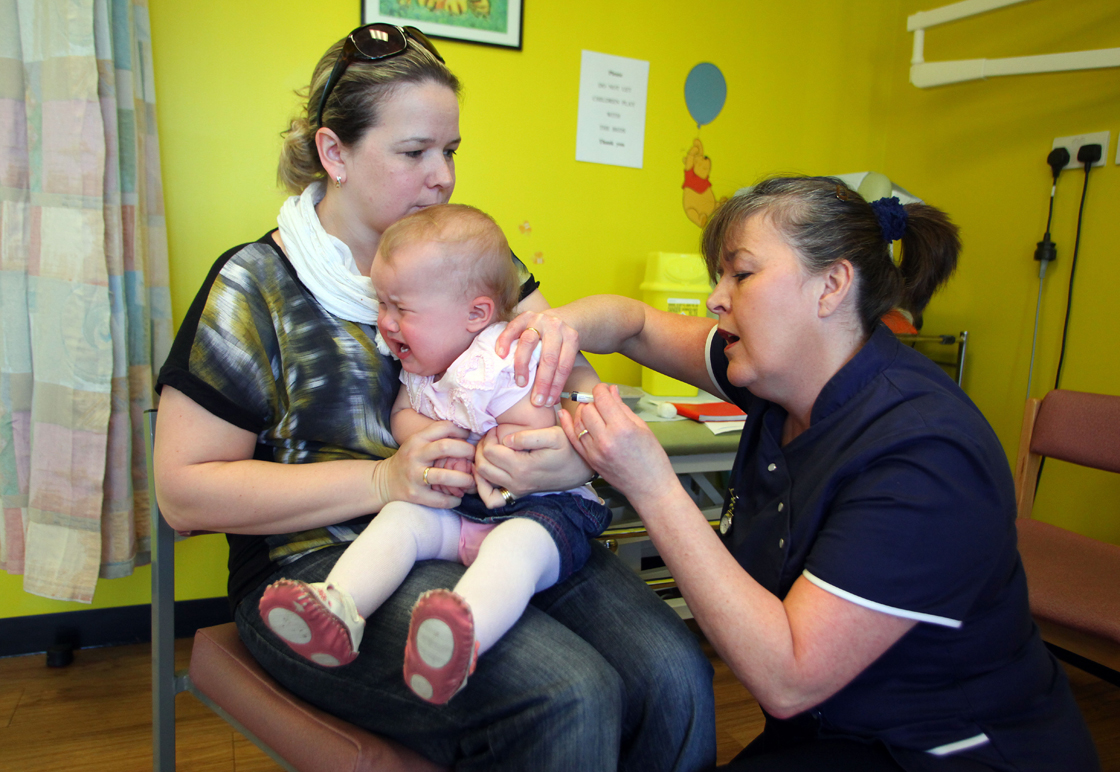TORONTO – A large measles outbreak that occurred in Quebec a couple of years ago is raising more questions about whether babies are getting their first dose of measles vaccine at too young an age.

A new analysis of the 2011 outbreak, which involved a surprising number of children who should have been protected against the virus, suggests giving the first dose of measles vaccine at 12 months may be undermining the efficacy of the vaccination program.
And it raises the possibility that a growing pool of vaccinated children may still be vulnerable to infection – which, if true, could put in jeopardy efforts to eliminate and eventually eradicate measles, one of the authors of the study said in an interview.
Read more: Should flu shots be mandatory for health care workers?
“This study shows that there is vulnerability in children who receive two doses and we should not overlook that. The reason for that is still unknown. But it is important to dig into this question further,” said Dr. Gaston de Serres, an infectious diseases specialist with Quebec’s provincial public health agency.
“If we create a vast pool of susceptibles, one day or another it won’t be an outbreak of 700 cases like we had in Quebec, but it may be thousands of cases, if not more.”
The new study was published Monday in the journal Pediatrics.
De Serres and colleagues have been mining data from the 2011 high school outbreak to try to figure out why at 102 of the 725 children infected caught the disease at all. They had received the recommended two doses of measles vaccine when they were young children.
Read more: Children’s cancer wing transforms into superhero ward offering ‘superformula’ chemotherapy
An earlier study by the same researchers showed that in the outbreak, teens who got their first dose at 12 months – the time that is recommended across Canada – were six times more likely to be infected than those who got their first shot at 15 months of age.

Get weekly health news
When they published that study, one of the suggestions was that a phenomenon known as “maternal antibody” may have been responsible.
It takes time for the human immune system to develop. But babies survive infancy because they receive antibodies to diseases their mothers have either experienced through infection or been introduced to through vaccination.
Maternal antibodies wane over time. But while they are present, if a baby is given a vaccine made from a live but weakened virus, the maternal antibodies may quell the vaccine virus before it has a chance to induce a strong immune response. Measles vaccine is a live-virus serum.
So immunization programs are planned to try to hit the sweet spot, giving vaccines in time to protect toddlers against threats but not so soon that the vaccines won’t be fully effective.
Read more: Preschoolers’ eating habits linked to future heart health risks, Canadian study suggests
It’s thought that women who had measles would have higher levels of maternal antibodies than women whose immunity was due to vaccination. Most people born before measles vaccination programs began in Canada in the early 1970s would have been infected with the highly contagious virus.
If maternal antibody was behind the inadequate protection, some argue this is a problem that will simply melt away. That’s because in parts of the world where measles vaccine coverage is high, women who were infected with measles are moving out of their child-bearing years. Twelve months for the first shot might be just fine for the children of women whose antibodies were generated by vaccination, the thinking goes.
But this new work suggests that theory may be optimistic.
Though the numbers in this study are small, there were fully vaccinated children of vaccinated mothers among the measles cases.
And other studies have shown that when you compare the antibody responses of children who get their first dose of measles vaccine at six months, nine months or 12 months, the quantity and durability of the antibodies differs markedly.
Read more: Toronto hospital launching landmark study following pregnant women and their babies
De Serres said this suggests that the immune system needs to have reached a certain point of maturation before measles vaccine will really take well. And even if second – or third, or fourth – doses are given, children whose first dose was given too early do not get as much protection from the vaccine as children who got their initial dose at 15 months.
Dr. Diane Griffin is a measles expert at Johns Hopkins Bloomberg School of Public Health in Baltimore, Md. She said the work on the Quebec outbreak raises serious questions about whether measles vaccine campaigns that start at 12 months are adequately protecting children.
She said she would probably recommend giving the first shot later – especially given that in current day North America, the risk of being exposed to measles in infancy is low.
“I would say that 15 months is probably a better time to vaccinate,” Griffin said.
She shares the concern that there may be a growing pool of children who could be infected if the virus is imported from parts of the world where measles still circulates widely.
“I think that’s clearly a possibility,” Griffin said.
She noted that children who have been vaccinated but go on to be infected generally have a milder disease, so on an individual level the risk wouldn’t be great. But having many more children who can catch and spread the virus than public health officials think are out there would make it much more difficult to contain and eventually wipe out measles.
Both De Serres and Griffin said data from the Quebec outbreak cannot answer the question of whether this phenomenon was triggered by giving the first vaccine too soon. But both said it’s important to try to find an answer to the question.







Comments